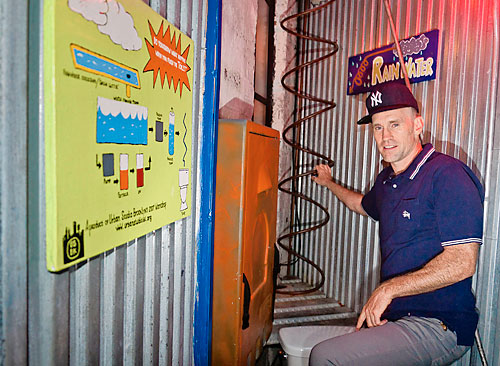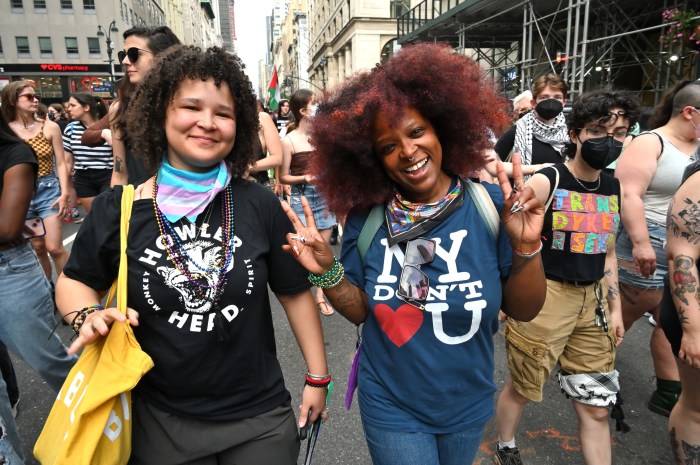Mayor Eric Adams claimed Thursday he wants to scrap the city’s curbside organics pickup expansion to more neighborhoods so that he can come up with a better alternative.
The mayor called Gotham’s current compost collection program “broken” and just “symbolic,” adding he is working with his administration to improve it as he hopes to cut tens of millions of dollars slated for a rollout by his predecessor Bill de Blasio.
“I just don’t see how you use diesel trucks to move around the city and pick up those recyclable food products that a minimal amount of people are actually participating in — that’s a broken system,” Adams told reporters during an unrelated press conference Thursday.
Hizzoner said City Hall’s environmental team is looking to other states and countries for how to get as many people on board as possible for a better composting program.
“We did not have it right, and I want to get it right so that we won’t use taxpayers’ money and dollars just to do a symbolic program,” Adams said.
In his preliminary budget, Mayor Adams plans to stop expanding the brown bin collection service to more neighborhoods in the city as a cost-saving measure, Politico first reported.
He wants to shave off $9.4 million in expansions this year, $18.2 million next year and more than $21 million for three following years, budget documents show.
The savings for next year are less than 0.02 percent of his total $98.5 billion spending plan.
The program dates back to the final year of the Michael Bloomberg administration in 2013, and aimed to divert organic food waste, which makes up about 30 percent of residential garbage. If dumped with regular garbage and left to rot, organics emit the harmful greenhouse gas methane and contribute to global warning.
Even back then, the Big Apple already lagged behind other metropolises like San Francisco, where the city started requiring separation of recycling and organics back in 2009.
Under de Blasio’s management, the program wasted away, with just 10 percent of people taking advantage of it in areas where it was available, and the former mayor quickly disposed of the service altogether as part of $160 million in cuts to Sanitation during the COVID-19 budget crunch of 2020.
On the campaign trail, Adams had said that move “was a mistake,” and he responded to a candidate survey by news site The City saying it should be expanded to all New Yorkers and be mandatory.
De Blasio ended up putting the program on hiatus for more than a year during the pandemic, but restarted it on an opt-in basis in the fall in community districts showing large demand.
DSNY saw the highest response rates in wealthier and whiter parts of the city like Brooklyn’s Park Slope, Riverdale in the Bronx, and the Upper West Side of Manhattan, replicating the old program’s shortcomings of primarily serving tonier neighborhoods.
Only 5 percent of addresses in eligible districts have signed up so far, or 30,713, according to DSNY data, and as of Feb. 28, a little over a third of those, or 10,834, will have the curbside pickup.
More than 8,000 addresses in those areas are “not yet ready for service,” for various reasons, but in 90 percent of cases they are in multi-unit buildings where tenants have applied, but the city has not been able to get a rep for the entire building like a landlord or management company to sign up.
Another 8,580 addresses outside of the coverage area have expressed interest, but won’t be able to get it under the current program.
Adams’s former rival for Gracie Mansion and onetime-Sanitation Commissioner Kathryn Garcia derided de Blasio’s compost comeback plan last year for turning the public service into a “luxury” for New Yorkers who have the resources to organize community support.
The next fiscal spending plan still needs to be hashed out between Mayor Adams and the City Council over the coming months before its approval at the end of the city’s fiscal year on June 30.
After the initial news broke about Adams’s proposed cutbacks Wednesday night, the Council’s Sanitation committee chair Sandy Nurse (D–Brooklyn) released a statement on social media denouncing his reversal and vowing to challenge the move in upcoming budget talks.
“The consequences of not equitably expanding the organics program are more rats ripping open our trash bags and thus more litter on our streets,” said Nurse. “I — alongside many Council colleagues and community organizations — will organize and advocate for the Sanitation budget to be restored and expanded in order to meet the daily needs of every block across the city.”
A version of this story first appeared on amNewYork.

















